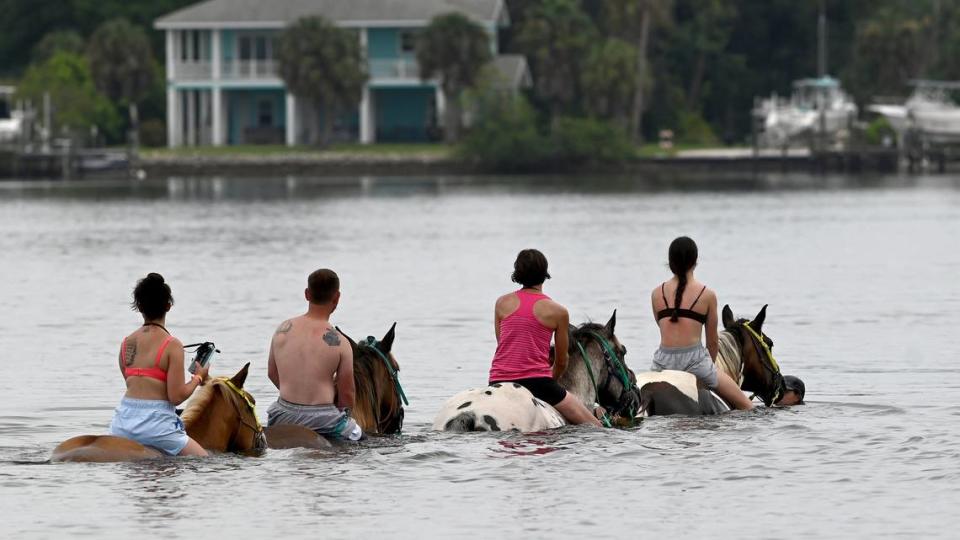Are horses causing water quality issues in Bradenton’s Palma Sola Bay? It’s complicated
After years of debate over whether horseback riding along the Palma Sola Causeway is making water quality worse, a local scientist said it’s difficult to tell without more research.
The Bradenton City Council heard a detailed presentation from Dave Tomasko, executive director of the Sarasota Bay Estuary Program, Wednesday morning. Constant water samples show that Palma Sola Bay remains healthy he said, but further investigation will be needed to determine if it’s being impacted by horse activity.
For more than 10 years, residents and local politicians have gone back and forth over whether horses should be banned from the causeway. Critics say the horses trample seagrass and leave behind manure that negatively impacts water quality, but horseback tour operators say they take special precautions to clean up behind themselves and protect the bay.
Years of water quality analysis show that Palma Sola remains one of the healthiest bodies of water along Sarasota Bay, according to Tomasko.
“It might surprise people, but it is the No. 1 dolphin nursery in all of Sarasota Bay,” said Tomasko. “It continues to be a healthy system from all our metrics.”
However, the Sarasota Bay Estuary Program’s routine data collection does show that there are higher levels of bacteria on the north side of Palma Sola where companies offer horseback riding tours.
Are horses affecting Bradenton’s water quality?
Tomasko noted that the higher levels of bacteria are not proof that horses are responsible. While horse manure could be a source of enterococci bacteria, human waste, grass clippings and decomposing seagrass can also produce higher bacteria levels.
When enterococci bacteria rise above a certain level, the Florida Department of Health in Manatee County issues temporary no-swim advisories warning residents about the hazard of entering the water. The most recent alert was issued on the south side of Palma Sola on July 20.
A detailed study will be necessary to determine whether horses are to blame for the “poor” bacteria values on the north side.
“Overall, the key thing is we’re trying to be focused on the forest. Is there a localized impact? Probably, but the overall health of the bay is healthy,” Tomasko said.
Before the city bans horseback riding operators from Palma Sola Causeway, Mayor Gene Brown urged the council to consider the entire picture. He said he didn’t want to “pick on” one source of pollution.
“We’ve got to look at the overall situation, and not just one,” said Brown.
Horseback companies push for beach access
Councilwoman Jayne Kocher also cautioned against a ban on horseback riding along Palma Sola Bay. She argued that Bradenton should avoid joining the “growing trend” of restricting access to local beaches.
“I want to make sure we keep a place for everybody. This is the only place the dogs have to go. This is the only place the horses have to go,” Kocher said. “I want to keep the bay safe, but I think we have to keep the public’s interest in on this, as well.”
Horseback tour operators also shared their thoughts on the subject during Wednesday’s public meeting. They said they make sure to clean up after their horses and collect any trash left behind by their clients and other beachgoers.
Carmen Hanson, the owner of C Ponies Horseback Rides, accused critics of spreading false information about how horses impact the water.
“This is the only horse area we have to ride, and we all cherish the opportunity to be able to horseback ride and take the horses into the bay,” Hanson said.
The owner of another horseback riding company, Carousel Sea Horses, urged city leaders to protect their access to the beach.
“That’s a big thing for us,” said Mercedes Pages, who founded the company last year.
In response, council members said they may consider conducting a water quality study in the future to determine the exact source of the bacteria in Palma Sola Bay. Board members did not vote to approve a study during Wednesday’s meeting, but Tomasko said he would expect it to cost less than $10,000.
“The most important part is the data. If we can get the data, we can know what can be done to make it even healthier,” Brown said.



